Rajaswala information, meaning, dharma, misconceptions, menstrual period, in women (Hinduism) | What is Rajaswala Dosha? | Can a girl go to temple in periods? | Why girls don’t do pooja in periods? | Why is Rajaswala Paricharya (conduct) important?
Namaste friends, how are you doing today? Welcome to #BhagavanBhakthi website / blog.
Bhagavan Lord Sri Krishna (Vishnu, Rama, Dattatreya, Narasimha, Kapila, Trivikrama) and Goddess Rukmini (Lakshmi, Sita, Anagha, Dharini) blessings to you and your family!
In this website / blog, you will always learn about #Hinduism #Sanskrit language.
Also subscribe to my YouTube channel from this link #BhagavanBhakthi to view videos about #Hinduism #Sanskrit language.
Just before going to “Rajaswala information, meaning, dharma, misconceptions, menstrual period, in women (Hinduism) | What is Rajaswala Dosha? | Can a girl go to temple in periods? | Why girls don’t do pooja in periods? | Why is Rajaswala Paricharya (conduct) important?“, let us know a brief, basic and very important information.
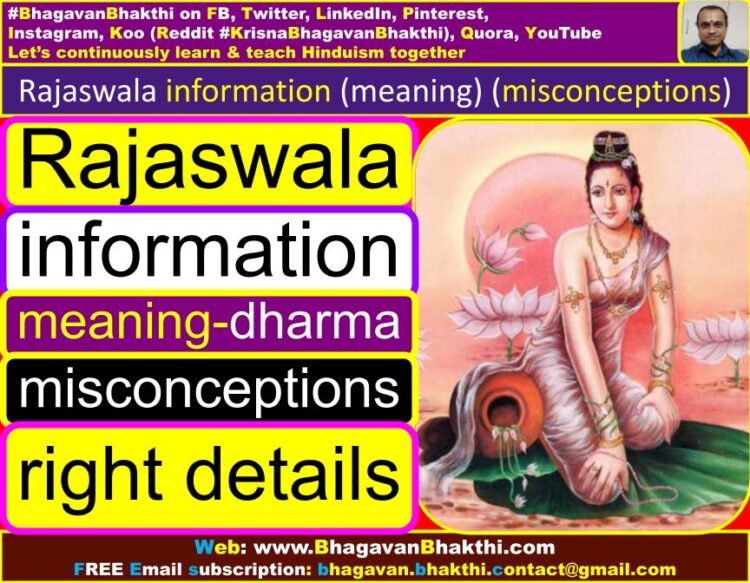
Rajaswala (रजस्वला) is a woman (period) who is in her monthly menstrual period timeframe. Rajas (रजस् / ರಜಸ್ / rajas) in Sanskrit means the menses in English. In Rajaswala, ‘wala‘ means a woman in her monthly menstrual period timeframe.
The contents of this article is as given below:
Rajaswala information, meaning, dharma, misconceptions, menstrual period, in women (Hinduism) | What is Rajaswala Dosha? | Can a girl go to temple in periods? |
Why girls don’t do pooja in periods? | Why is Rajaswala Paricharya (conduct) important? Meaning of Brahma Hatya Dosha with examples | And much more…
Misconceptions (myths) about Rajaswala (Menstruation / monthly period) is as given below:
Rajaswala is one of the most controversial, highly misunderstood, very less practiced issue. In this post, let us understand about Rajaswala in more deeper way and as per Sanatana Dharma way.
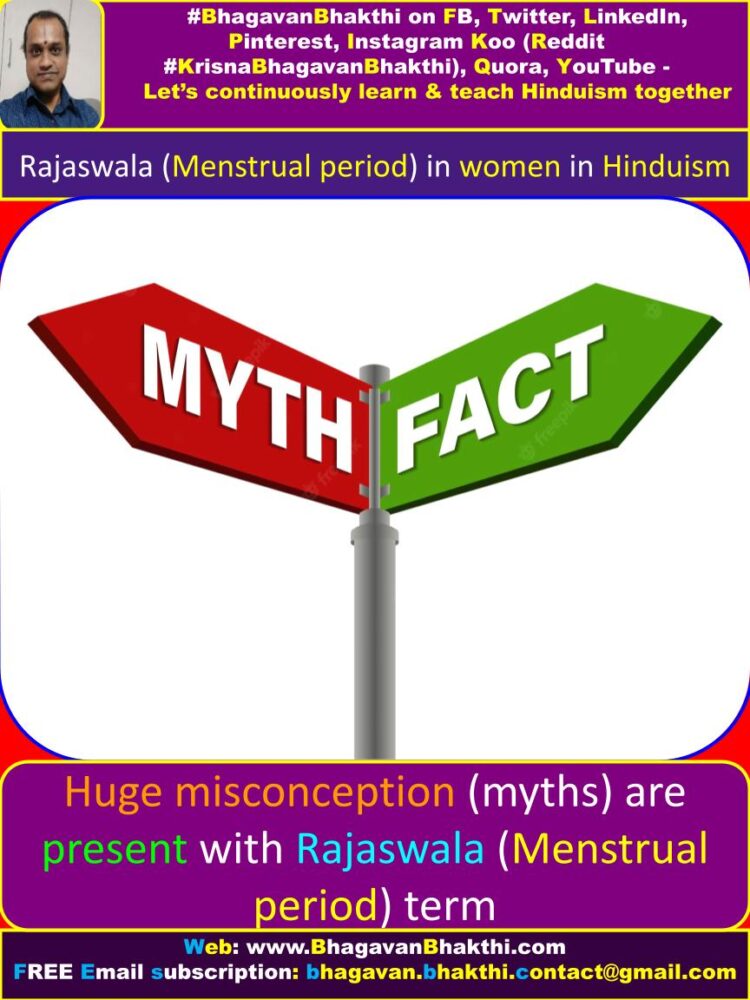
First of all, let us clear the misconceptions, misunderstanding, confusion, misinterpretation, misread, miscalculated, false impression, illusion, misjudgment, etc. about Rajaswala.
Whatever we understand anything related to Sanatana Dharma, we need to understand it by as per Sanatana Dharma (Hindu Texts) way only with examples. Just by reading one or more words or sentences, we can’t understand the meaning given as per Sanatana Dharma.
This may lead to senseless, insensible, pointless, futile, hopeless, fruitless, needless, worthless, purposeless, etc. meaning(s). This type of misunderstood, misjudged, miscalculated, misinterpreted, misread, etc. subject is Rajaswala or Rajaswala Dharma.
But in this post, let us know the well understood, properly judged, well calculated, correctly interpreted, correctly read, etc. information about Rajaswala (menstruation / period cycle).
Information about Rajaswala (Rajaswala Dharma) is as given below:
First of all we should always remember that Rajaswala is called as Rajaswala Dharma. Here Dharma means related to Dharma (duty) (conduct) (paricharya) and not at all related to religion.
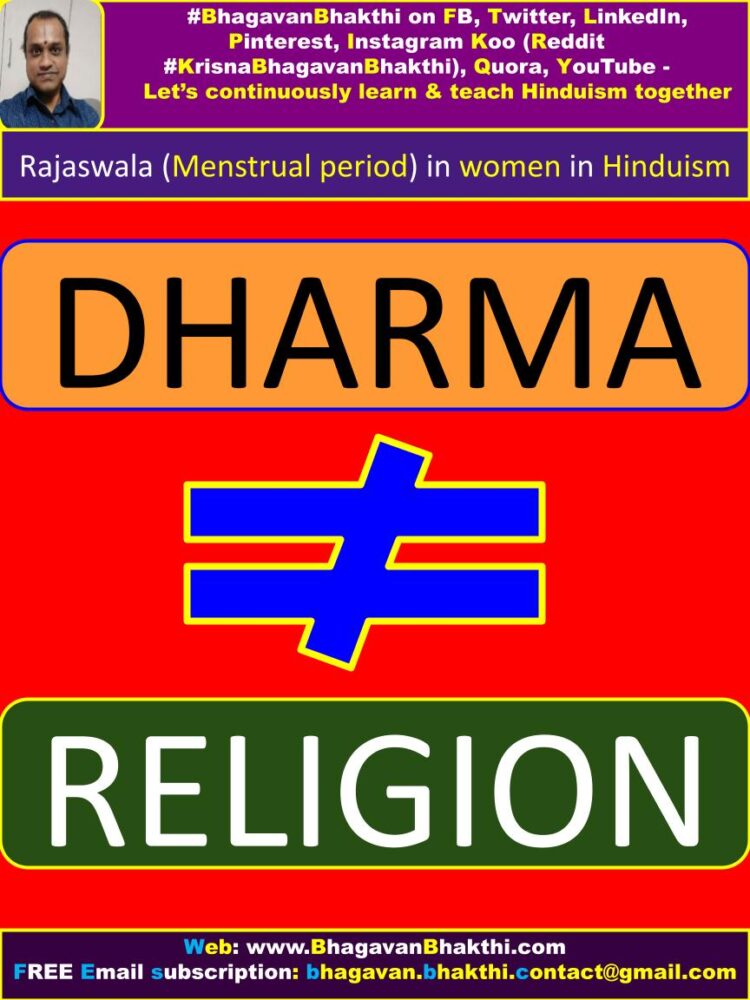
Dharma (Sanatana Dharma) was started by Lord Sri Vishnu himself and religion is built by so called mere humans. There is a huge difference between Dharma and religion. Europeans have given this word religion in connection to Dharma, which is completely incorrect as per Sanatana Dharma.
As per Sanatana Dharma, Dharma means, we need to do one or more things which will make Lord Sri Vishnu happy and satisfied.
This or these Dharma(s) are the duties which are the instruments for the realization of God, that is, Lord Sri Vishnu. Through the practice of Rajaswala Dharma (paricharya) (conduct), a woman becomes sensitive to her ‘aparoksha gyan‘ (अपरोक्ष ज्ञान) (aparōkṣa jñāna) (Divine knowledge).
That is, ladies will become more closer to Lord Sri Vishnu’s blessings with the correct knowledge of Rajaswala (Rajaswala Dharma). But, unfortunately in today’s world (Kali Yuga), we have lost the real and correct knowledge about Rajaswala (Rajaswala Dharma).

In few houses, the ladies in their Rajaswala period (monthly menstruation period) have to face lot of problems like horrible treatment, fights at home, quarrels at home, if a woman becomes Rajaswala, she might start to feel the anxiety, etc.
But, all these have to be avoided and have to think that Rajaswala is a Dharma and there is no space for any anxiety, tension, fight, quarrel, etc. at or outside home.
If a woman has become Rajaswala (in her monthly menstruation period), others at home have to understand her and have to cooperate with her completely.
The family members like husband, mother, mother-in-law, father, father-in-law, sister, sister-in-laws, brother, brother-in-laws, etc. must and should understand the situation of the Rajaswala woman and have to cooperate with her.
This is very much clearly given in our great Sanatana Dharma, that is, in Hindu texts and scriptures. The family members who think negative about the Rajaswala woman, will get negative boons from Lord Sri Vishnu and other Devatas (Demigods).
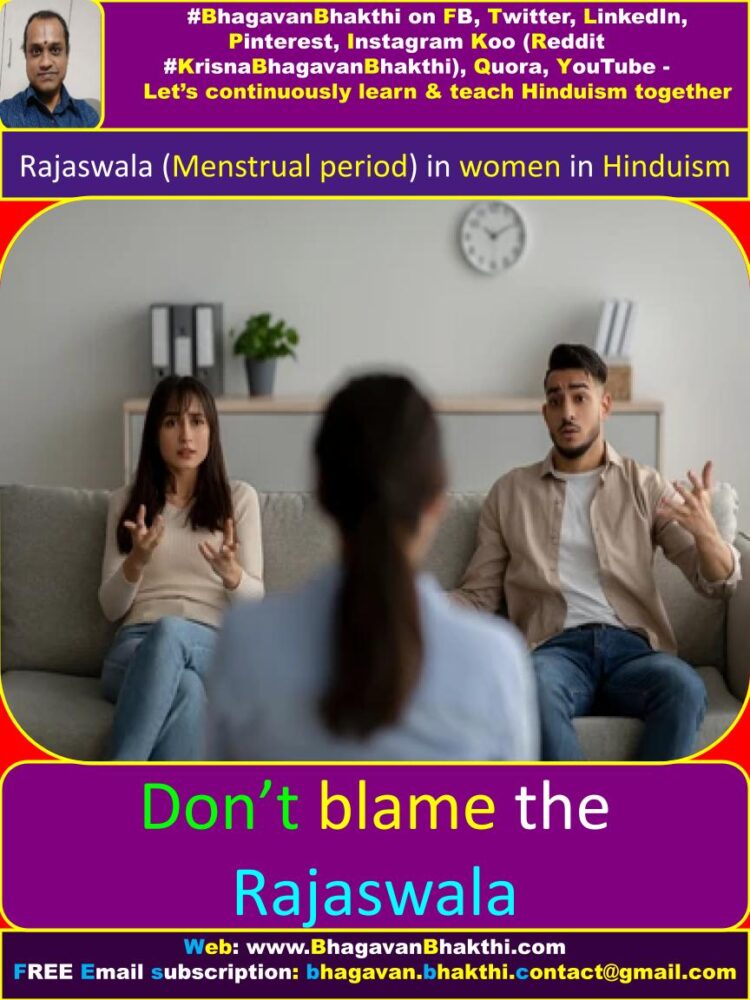
In our Sanatana Dharma (Hindu Texts) it is said that, “अपध्व-सम-वाप्नोति देवानाम् (apadhva-sama-vāpnōti dēvānām)“, that is – “Those family member(s) who go against a Rajaswala woman or talking and / or misbehaving with a Rajaswala woman is completely against the Dharma of Lord Sri Vishnu.”
These family members are talking and / or misbehaving against a woman who will be the reason for the development of that same family (lineage). A husband who want to get the love of a woman, he is going against that same woman.
A mother-in-law and / or a father-in-law who’s lineage will be developed because of her own daughter-in-law are going against that same woman. A father or mother from whom this lovely and beautiful daughter has taken birth, are going against that same woman.
The sister-in-laws who also face the same issue through out their life, are going against that same woman. In total, these family member(s) who think ill of a Rajaswala woman are going against the rule of Lord Sri Vishnu himself.
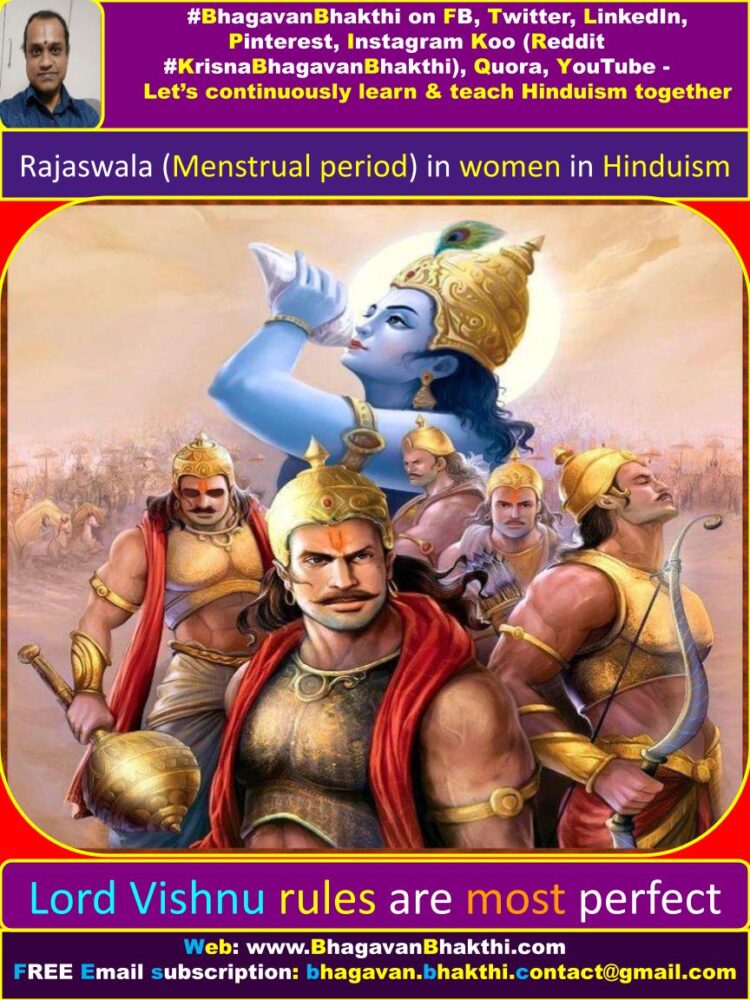
We should never blame the rain, water, Sun light, air, or any law(s) of nature made by Lord Sri Vishnu. Because of all of these we humans are alive today. If these rain, water, Sun light, air, or any law(s) of nature are not present means, we can’t sustain on this earth.
Similarly, a woman have to face the 3 – 4 days of Rajaswala period. Because she faces that, a family (lineage) can be developed. Otherwise, how can a family (lineage) can be developed if a woman does not becomes Rajaswala every month? Think over it my dear friends…
The family member(s) who blames the woman who becomes Rajaswala, will that family welcome a woman who is not at all a real woman, that is, who is not under the menstruation cycle? A man will marry a woman who is not under the menstruation cycle?
Is this possible for any family and / or a man? No right. A woman has to be in Rajaswala period (menstruation cycle) every month, then only she will be called as a woman.
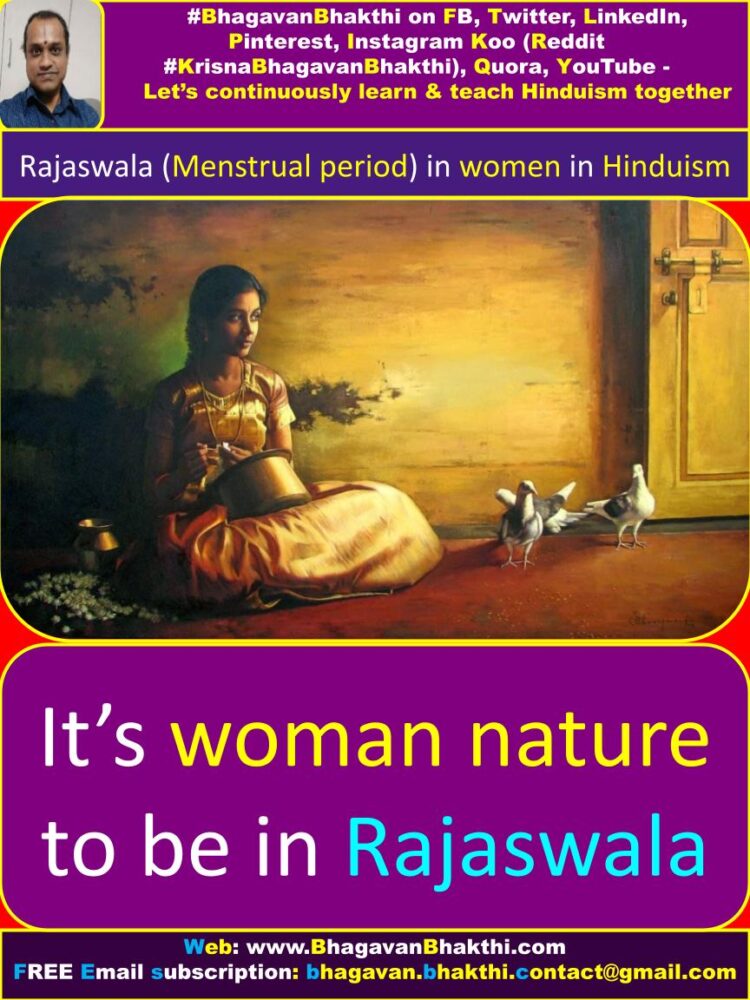
Thus the family need to give full respect to that woman through out the life term. Because of this woman, we are existing.
We as the family member(s) have to admire her, appreciate her, value her, cherish her, give importance to her, love her, acknowledge her, otherwise we are going against our own Sanatana Dharma and going against the rules of Lord Sri Vishnu.
Whenever our wife, sister, daughter-in-law, mother become Rajaswala, we need to support her, so that she can do her Dharma. We as the family member(s), need to give highest respect to her during her Rajaswala period than the normal time.
Especially the mother and father should give correct information to their children about the Rajaswala woman. From the young age itself, both mother and father should keep on giving right information about the Rajaswala woman to their children.

Rajaswala and the Brahma Hatya Dosha relationship is as given below:
Rajaswala meaning : In simple words Rajaswala means, a woman in her monthly period (menstruation cycle).
Brahma Hatya : This is a distinctive ingredient present in few special beings like Rajaswala ladies, fire, water, etc.
Brahma Hatya Dosha meaning : In simple words Brahma Hatya Dosha means, sin of killing a Brahmana (Brahmin) without a correct reason.
There are many people who have misunderstood the story of Lord Sri Indra Deva and Brahma Hatya Dosha. These people have not at all properly understood the correct story of Lord Sri Indra Deva and Brahma Hatya Dosha.
Rajaswala means not the one who has done the Brahma Hatya. But the one who will give (pass on) the Brahma Hatya to a sinner. Just like a judge gives judgement to a criminal.
Again I am repeating here, many people will misunderstand these words and the situation. But we need to understand this very carefully and highly intelligently.
In Rajas (menses) there is a presence of Brahma Hatya. But a woman in her Rajaswala period doesn’t has the Brahma Hatya Dosha (blot). The man / woman who wants to have the intercourse with a Rajaswala woman, that man / woman will get the Brahma Hatya Dosha.
First of all, this has to be clarified. Again I am repeating, a man / woman who want to have sex (mating) with a Rajaswala woman, that man / woman (lesbian) will get the Brahma Hatya Dosha.
Let us understand about this in more detailed way without blaming the great Sanatana Dharma (Hindu Texts) or Hinduism or Lord Sri Vishnu or Devatas (Demigods), etc.
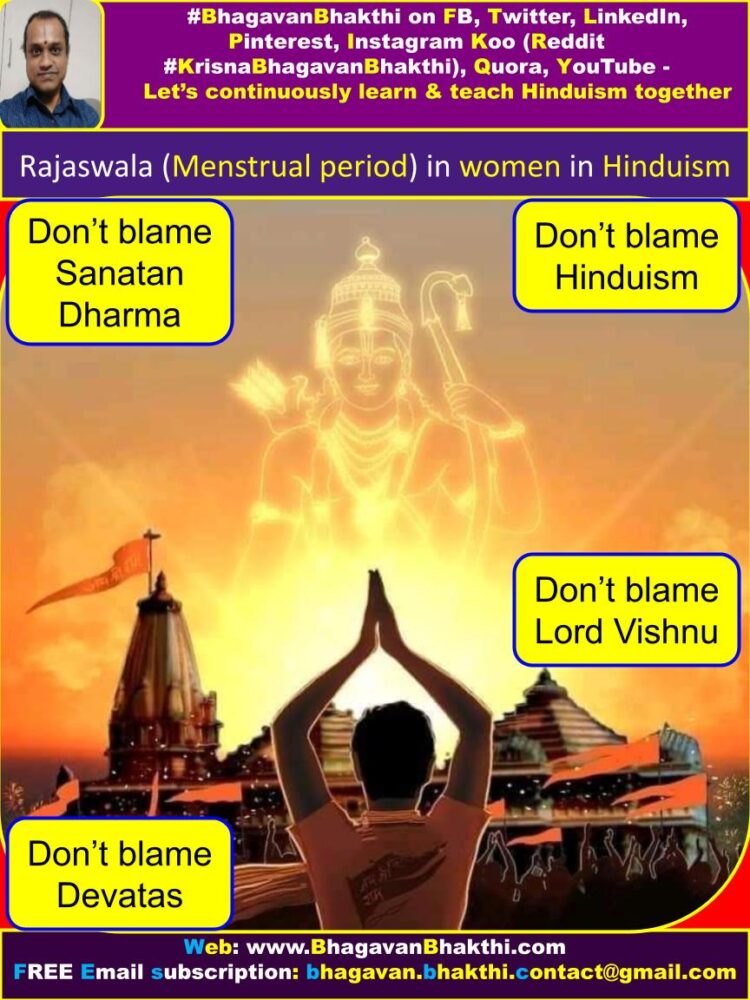
Story of Brahma Hatya or Brahma Hatya Dosha and Lord Sri Indra Deva is as given below:
Once Lord Sri Indra Deva cuts off the head of a Brahmana (Brahmin) named Vishwaroopacharya. Similarly, Lord Sri Indra Deva has also killed another Brahmana (Brahmin) demon called as Vritrasura (वृत्रासुर).
Since Lord Sri Indra Deva kills these two, that is, Vishwaroopacharya and Vritrasura, he (Lord Sri Indra Deva) gets the Brahma Hatya Dosha (Sin of killing a Brahmana / Brahmin). Lord Sri Indra Deva himself will divide the dosha (sin) of killing the Brahmana (Brahmin) Vishwaroopacharya.
While Lord Sri Brahma Deva will divide the dosha (sin) of killing the Brahmana (Brahmin) demon Vritrasura. Lord Sri Indra Deva will install the Brahma Hatya inside bhumi (land), water, herbs and ladies in Rajaswala period.
(Please remember that, I am again and again repeating, that is, only Brahma Hatya and not Brahma Hatya Dosha.)
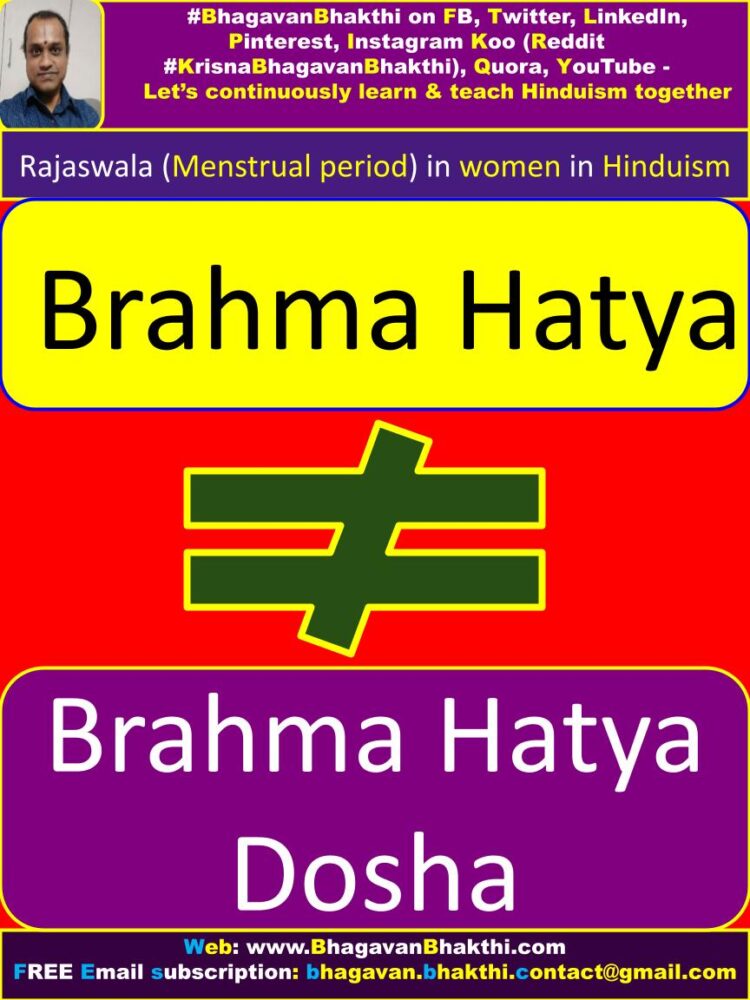
This is very clearly said in Srimad Bhagavatam in 6th chapter as given below:
भूम्यम्बुद्रुमयोषिद्भ्यः चतुर्धा व्यभजद् हरिः | ಭೂಮ್ಯಂಬುದ್ರುಮಯೋಷಿದ್ಭ್ಯಃ ಚತುರ್ಧಾ ವ್ಯಭಜದ್ ಹರಿಃ | Bhūmyambudrumayōṣidbhyaḥ caturdhā vyabhajad hariḥ
While Lord Sri Brahma Deva will install the Brahma Hatya in agni (fire) instead of bhumi (land). Thus, from the above we can understand that, in both bhumi (land) and also in agni (fire), Brahma Hatya is present.
This is explained as given here: All these, that is, bhumi (land), water, herbs, ladies in Rajaswala period and agni (fire) will have the presence of Brahma Hatya, but not the Brahma Hatya Dosha.
This can be understood with this simple example : Brahmanas (Brahmins) are aware that they should not eat meat and drink alcohol. But still few of the Brahmanas (Brahmins) eat meat and also drink alcohol.
Thus all the Brahmanas (Brahmins) are not impure. But the Brahmanas (Brahmins) who eat meat and drink alcohol will become impure.
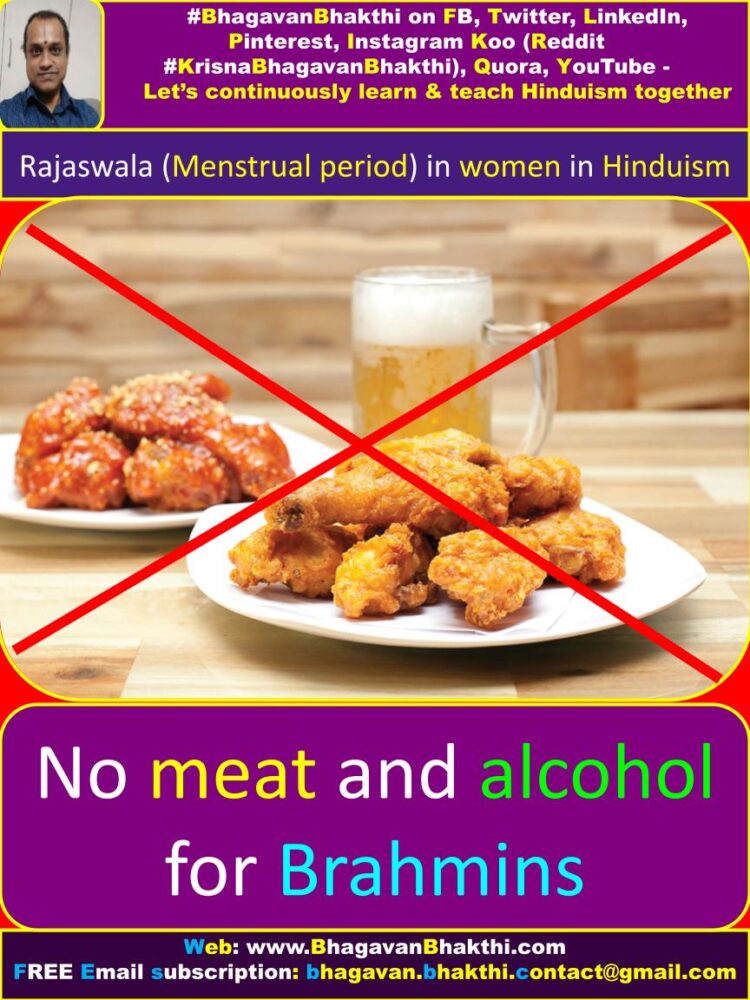
Similarly, Rajaswala ladies have the Brahma Hatya with them, but does not have the Brahma Hatya Dosha. But, the man / woman (lesbian) who want to have intercourse, that is, sex with a Rajaswala woman will be harmed by the Brahma Hatya Dosha.
We should all be very very much clear that, bhumi (land), water, herbs, ladies in Rajaswala period and agni (free) have the Brahma Hatya in them. But all these are not affected by the Brahma Hatya (or sin).
But rather all these above, that is, bhumi (land), water, herbs, ladies in Rajaswala period and agni (free) will pass the Brahma Hatya Dosha (sin) to sinners in very special cases.
In ‘Moksha Dharma Parva’ of Mahabharata, Pitamaha Bhishma provide the explanation about this.
If one cuts the tree(s) during the Parva Kaala (auspicious periods), that person (people) will be affected with the Brahma Hatya Dosha:
In the glue part of the trees, Brahma Hatya will be present. Thus, if someone touch the glue part of the tree, that person (people) has to take bath immediately.
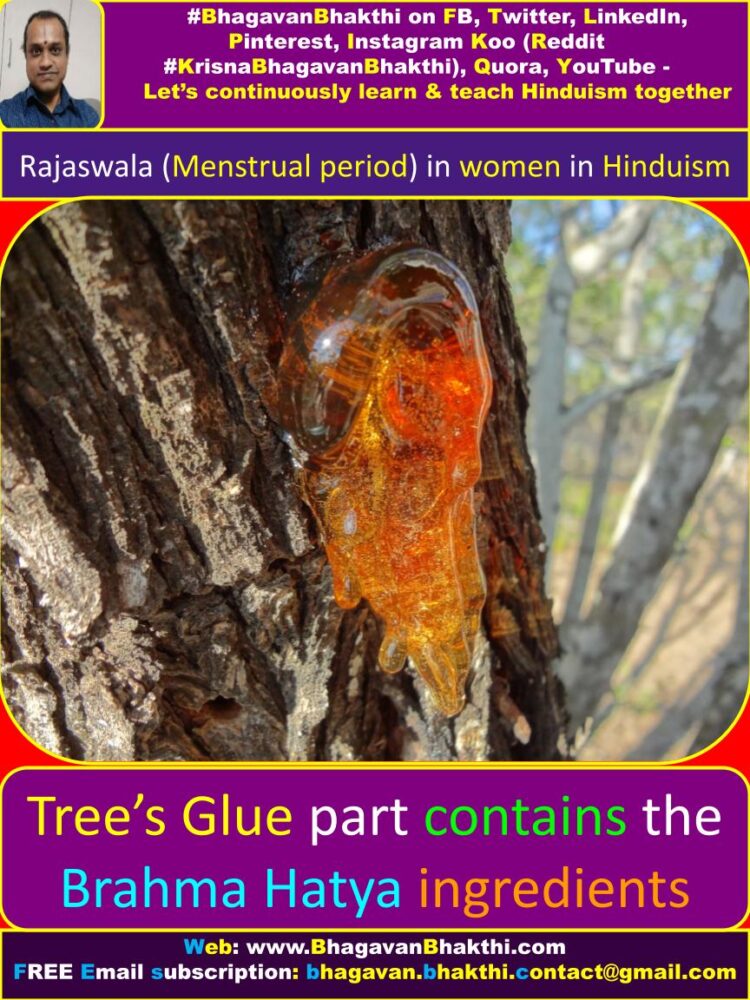
पर्वकाले तु संप्राप्ते यो वै छेदनभेदनम् | करिष्यति नरो मोहात्त मेषाऽनुगमिष्यति || ಪರ್ವಕಾಲೇ ತು ಸಮ್ಪ್ರಾಪ್ತೇ ಯೋ ವೈ ಛೇದನಭೇದನಮ್ | ಕರಿಷ್ಯತಿ ನರೋ ಮೋಹತ್ತ ಮೇಷಾऽನುಗಮಿಷ್ಯತಿ || parvakālē tu samprāptē yō vai chēdanabhēdanam | kariṣyati narō mōhatta mēṣā̕nugamiṣyati ||
Meaning of the above shloka : People who chop the tree(s) during the Parva Kaala (auspicious periods), they will be affected with the Brahma Hatya Dosha.
Thus for this reason, tree(s) shouldn’t be copped off during Purnima day, Amavasya day, Ashtami day, Sankranti period and Grahan (Eclipse) period.
But, for some highly importance reason if someone has to cut the tree(s) means, one has to provide lemon rice as food to people (This is not during the above said days, but on other days).
If someone chops one tree, then that person has to plant a minimum of four plants and also look after it for a minimum of three years until that plant grows as a tree.
If one passes urine and / or stool into water (river, pond, etc.), then that person will be affected with Brahma Hatya Dosha:
अल्पा इति मतिं कृत्वा यो नरो बुद्धि मोहितः | श्लेष्म मूत्र पुरीषाणि युष्मासु प्रतिमोक्ष्यति || तमियं यास्यति क्षित्रं तत्रैव च निवत्स्यति | तथा वो भविता मोक्ष इति सत्यं ब्रवीमि वः ||
ಅಲ್ಪಾ ಇತಿ ಮತಿಂ ಕೃತ್ವಾ ಯೋ ನರೋ ಬುದ್ಧಿ ಮೋಹಿತಃ | ಶ್ಲೇಷ್ಮ ಮೂತ್ರ ಪುರೀಷಾಣಿ ಯುಷ್ಮಾಸು ಪ್ರತಿಮೋಕ್ಷ್ಯತಿ || ತಮಿಯಂ ಯಾಸ್ಯತಿ ಕ್ಷಿತ್ರಂ ತತ್ರೈವ ಚ ನಿವತ್ಸ್ಯತಿ | ತಥಾ ವೋ ಭವಿತಾ ಮೋಕ್ಷ ಇತಿ ಸತ್ಯಂ ಬ್ರವೀಮಿ ವಃ ||
alpā iti matiṁ kr̥tvā yō narō bud’dhi mōhitaḥ | ślēṣma mūtra purīṣāṇi yuṣmāsu pratimōkṣyati || tamiyaṁ yāsyati kṣitraṁ tatraiva ca nivatsyati | tathā vō bhavitā mōkṣa iti satyaṁ bravīmi vaḥ ||
Meaning of the above sloka : Someone who passes the urine and / stool and / or who spit phlegm (kapha) into well, lake, pond, river, ocean, that person will be affected by Brahma Hatya Dosha.
(Also we shouldn’t be using any soap ingredients in any water bodies.)

Thus for this reason, one should never ever pass the urine and / or stool and / or spit phlegm (kapha) into well, lake, pond, river, ocean.
Someone who does the intercourse with a Rajaswala woman will be affected with the Brahma Hatya Dosha: As said above, ladies during their Rajaswala period will have Brahma Hatya. (And not the Brahma Hatya Dosha.)
रजस्वलासु नारीषु यो वै मैथुनमाचरेत् | तमेषा यास्यति क्षित्रं व्येतु वो मानसो ज्वरः || ರಜಸ್ವಲಾಸು ನಾರೀಷು ಯೋ ವೈ ಮೈಥುನಮಾಚರೇತ್ | ತಮೇಷಾ ಯಾಸ್ಯತಿ ಕ್ಷಿತ್ರಂ ವ್ಯೇತು ವೋ ಮನಸೋ ಜ್ವರಃ || rajasvalāsu nārīṣu yō vai maithunamācarēt | tamēṣā yāsyati kṣitraṁ vyētu vō manasō jvaraḥ ||
Meaning of the above sloka : The man who does the intercourse with a Rajaswala woman (Even if the woman gets involved with that man with lust) will be affected with Brahma Hatya Dosha.
A man should never ever get involved with Rajaswala woman for intercourse for first four days of Rajaswala period (menstruation period).
If a man gets involved in intercourse with a Rajaswala woman, then that man will lose all his earlier Dharmacharana (Good deeds) and also be affected with Brahma Hatya Dosha. This is clearly said by Maharishi Angirasa (Angiras) in Brahma Vaivartha Purana.
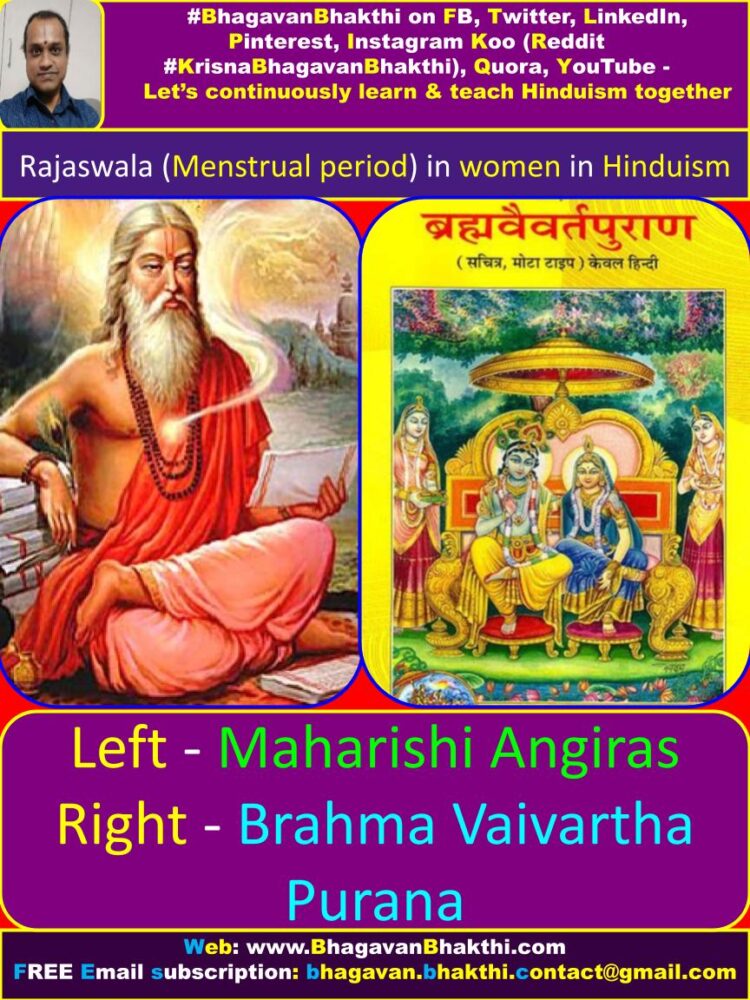
If we don’t use agni (fire) in the Bhagavad Aradhana (worship of God), we will get the Brahma Hatya: (Here Bhagavad Aradhana means, in worship of Lord Sri Vishnu.)
Smashanam (Smashan) (cremation ground) is the place where Brahma Hatya is present. For this reason, after visiting the Smashanam (Smashan) (cremation ground), one has to take the bath without miss.
Now, let us move to know more information about Rajaswala (Menstruation period) information:
One should never think that, “why only women have to face, so many problems“. No it is not at all like that. If women have some kind of problems means, even men have their unique type of problems and challenges. Lord Vishnu has gifted to the world a great and rare entity called woman to this world.
Both women and men are completely dependent on each other, and both are very unique and special and both can’t live without each other.
With this information, let us move forward in knowing about “Rajaswala (menstrual period) in women“.
Let us know step-by-step about the Rajaswala (menstrual period) in women as per Hinduism:
Story about Rishi Panchami vrata (vrat) : During the Dvapara Yuga the great Chakravarti (Emperor) Yudhisthira requested Lord Sri Krishna to tell him about a Vrata (vrat) which can make shuddhikarana (purify) from all the paapas / sins.
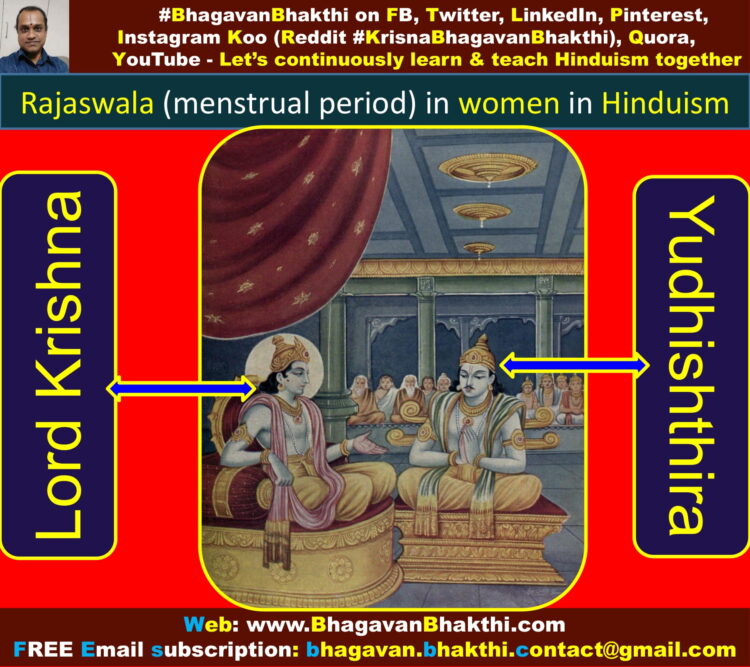
Thus, Lord Sri Krishna told Yudhisthira about the vrata (vrat) which was performed by women can free them from all their paapas / sins, which is termed as “Rishi Panchami”.
Lord Sri Krishna says this: Women during their rajaswala (menstrual period) are not supposed to perform any work pertaining to the household / family works. Invariably, those women need to take rest for the all the four days of rajaswala (menstrual period).
If a woman does all these works, that woman is sure of going to Naraka / hell. That is why a women during her rajaswala (menstrual period) should be kept far from all, irrespective of whether she is a Brahmana or a Kshatriya or a Vaishya or a Shudra.
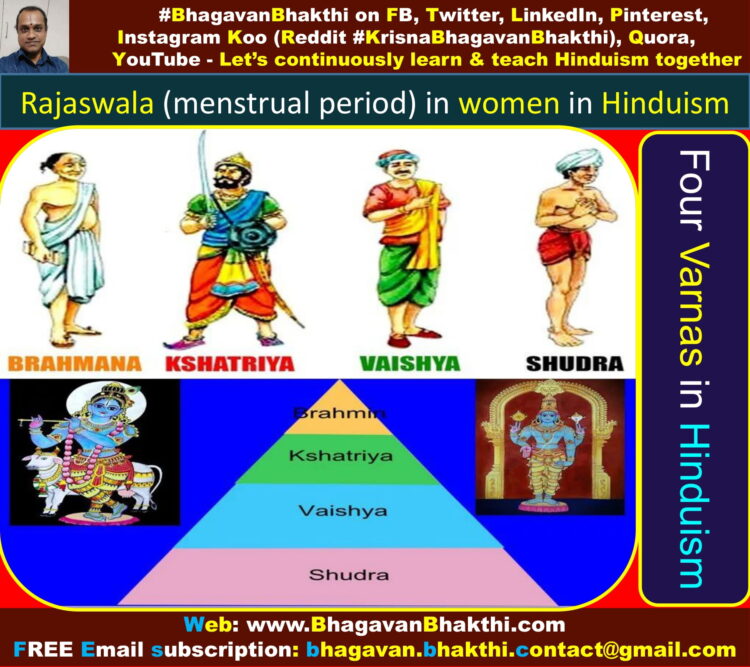
All the four varnas’ people must follow this rule. Thus, this is the reason if one does Rishi Panchami pooja / worship, her sins during rajaswala Dosha will be purified.
What is this rajaswala (menstrual period) as per Hinduism : Once upon a time, Lord Indra Deva had a terrible fight with an asura (demon) called Vritrasura and finally Lord Indra Deva killed that Asura (demon).
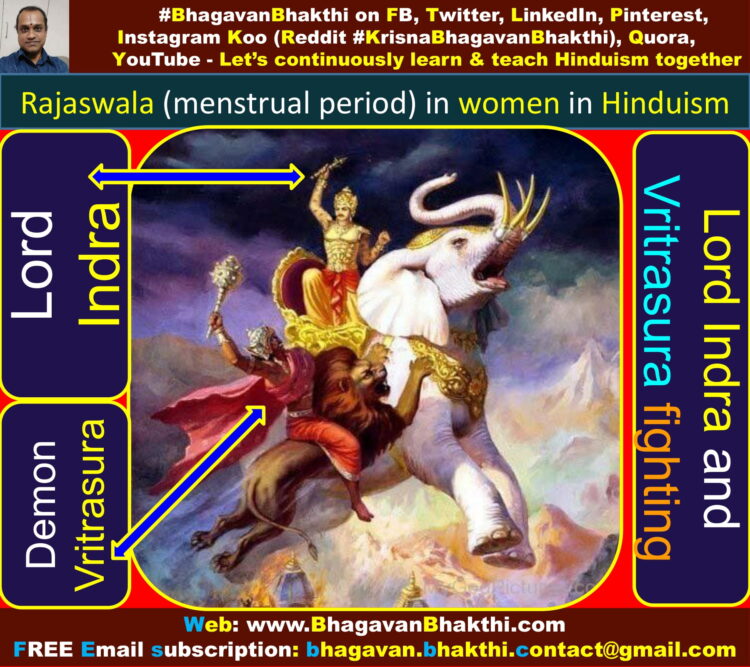
Lord Indra Deva got the ‘Brahmahatya dosha‘ (sin of killing a Brahmana), as Vritrasura although he was an asura (demon), Vritrasura was a son of a Brahmana. Thus, killing a Brahmana will fetch us ‘Brahmahatya dosha‘.
After killing this asura (demong) Vritrasura, Lord Indra Deva got the dosha (sin). Then Lord Indra Deva went to Lord Brahma Deva seeking some remedy to remove this ‘Brahmahatya dosha‘ (sin of killing a Brahmana).
Then Lord Brahma Deva removed Lord Indra Deva’s ‘Brahmahatya dosha‘ (sin of killing a Brahmana).
How Lord Brahma Deva removed this ‘Brahmahatya dosha‘ (sin of killing a Brahmana) of Lord Indra Deva is as given below:
Lord Brahma Deva divided the ‘Brahmahatya dosha‘ (sin of killing a Brahmana) into four parts. That is,
1. First part in Fire flame, 2. Second part in river water, 3. Third in Mountain & trees, and 4. Fourth in the ‘rajas‘ (रजस् / ರಜಸ್ / rajas) of women. (Here rajas in Sanskrit means menses in English).
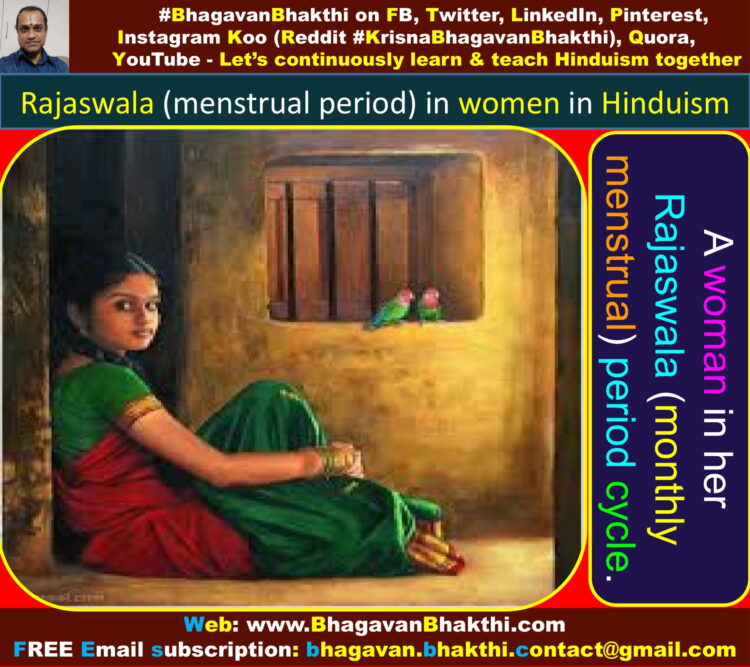
That is why rajaswala (menstrual period) women are supposed to be far from all the chatur varna (four varna) people.
(Note : Below a word called impure is been used. Here the word impure means, the body has to be cleaned up. Just like a child when he / she falls in dirty water, then that child has to be cleaned up.)
(Similarly, during rajaswala period, women has to be cleaned up in a 4 – 5 days of cyclic period. There is nothing religiousness here. But lots of technicality and logic is involved in this.)
On the first day of her rajaswala (menstrual period), women will be impure like a Chandala stree / lady. On the second day of her rajaswala (menstrual period), women will be impure like a Brahma Ghatini.
On the third day of her rajaswala (menstrual period), women will be impure like a dobhi. On the fourth day rajaswala (menstrual period), women will become pure. But still can’t do all the puja, pitru karya, cooking, etc. on fourth day itself.
But anyhow, that woman can attend to her daily duties other than Bhagavan’s seva (service), cooking. On the fifth day only, she will be completely pure.
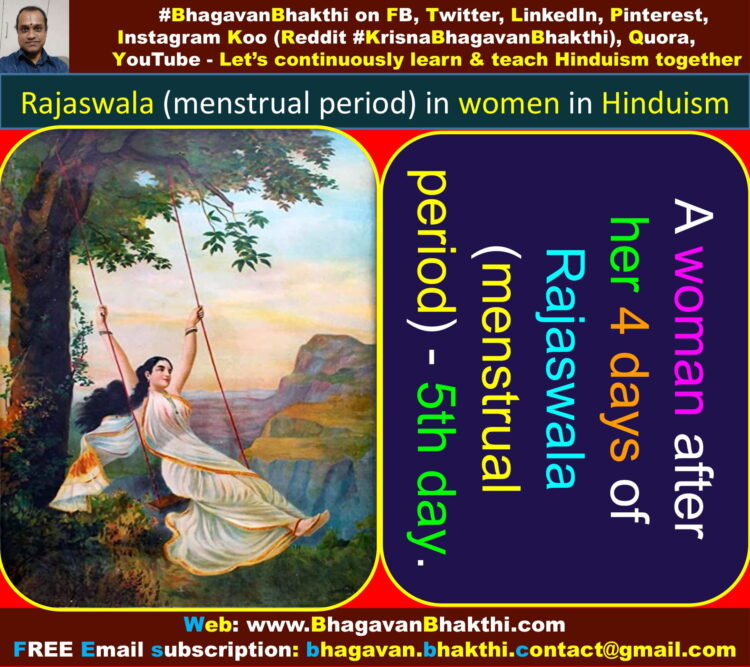
Lord Sri Krishna tells one more story about Rajaswala (menstrual period) which is as given below:
In Vidarba desha / country, there lived a Raja / king named Shenajita. In that desha / country there was a Brahmana called Sumitra and this Sumitra’s wife was called as Jayasri. This woman Jayasri who was also looking after the farming work.
Once this woman Jayasri had rajaswala / menstrual period. But without caring, Jayasri did all her regular work, and also Jayasri touched everything and every one without informing others that she was on the rajaswala / menstrual period.
After few days had past, Jayasri passed away. Also, Jayasri‘s her husband Sumitra also passed away after some time. Again after few days, in the same house both Sumitra and Jayasri were reborn as an Ox (Sumitra) and a Dog (Jayasri) respectively.
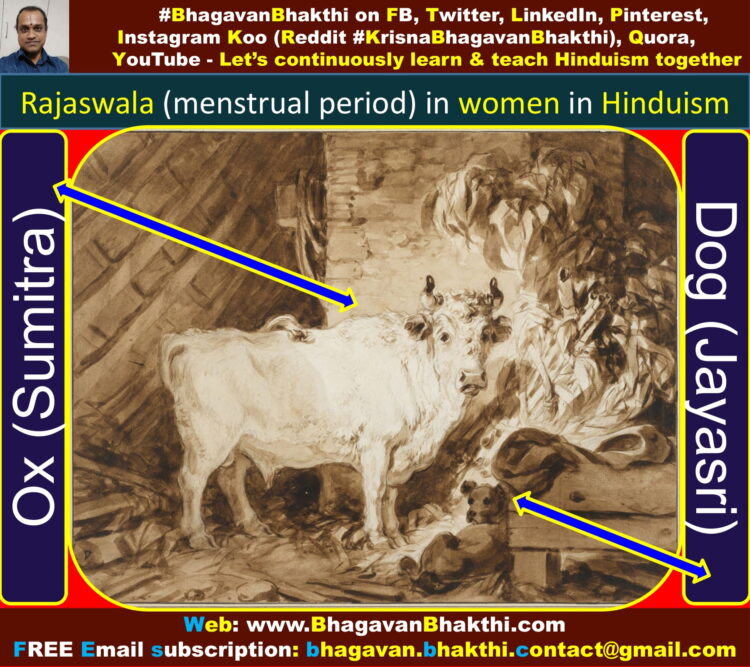
And they had the power of the jatismara (that is who can remember about their earlier janma / life).
Another story about Rajaswala (menstrual period) is as given below:
Sumitra’s son was Sumati and his wife was called as Chandravati. This Chandravati was a ‘saha dharmacharini‘ (someone who follows her husband very well as per the Dharma).
One day, Sumati’s father’s Shraaddha day (yearly Shraaddha) came and he (Sumati) told his wife Chandravati to cook for the Brahmana ladies (all suhagans / suvasini) for bhojanam / food and which she did.
Chandravati kept the payasam (kheer) vessel on the stove itself. A sarpam / snake’s poison was kept in that payasam (kheer). While a dog (Jayasri) saw the Payasam (kheer) was been poisoned.
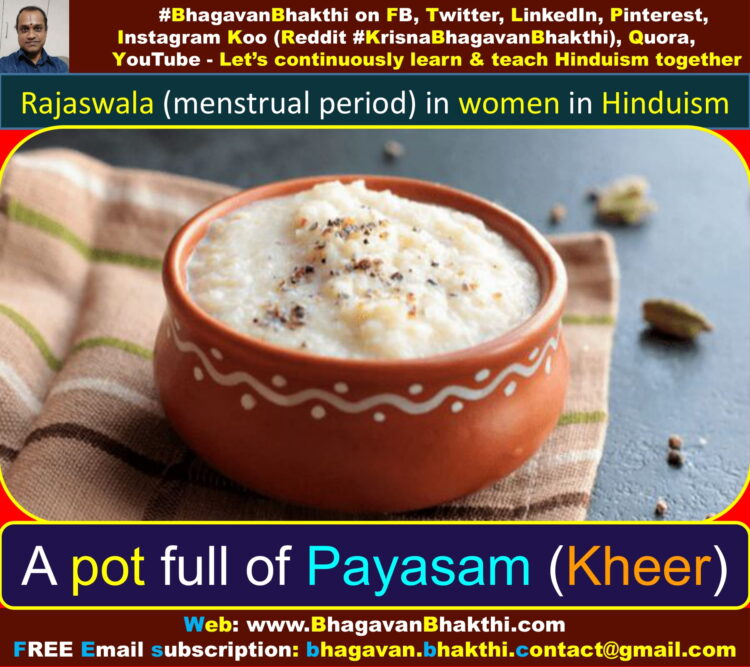
And thus that dog thought that, if the Brahmanas eat that payasam (kheer), they may die and her (Jaysri’s) son would get ‘Brahmahatya dosha‘ (Sin of killing a Brahmana). Thus, that dog (Jaysri) came and touched the payasam (kheer) vessel.
Seeing that, the dog (jayasri) had touched the vessel, Chandravati got angry and started to beat that dog (Jayasri). And finally threw that payasam (kheer) and prepared separate food for the shraaddha karya (shraaddha rituals).
Sumati did the shraaddha with enthusiasm and all the Brahmanas had good bhojanam / food. Chandramati dig a pit and kept all the left overs after the bhojanam / food in a pit without even giving anything to the Dog (Jayasri) or the Ox (Sumitra) on that particular day.
Thus that Ox (Sumitra) told to Dog (Jayasri) that, their son had done the shraaddha (श्राद्ध / ಶ್ರಾದ್ಧ / śrād’dha), but was not given anything to eat to them.
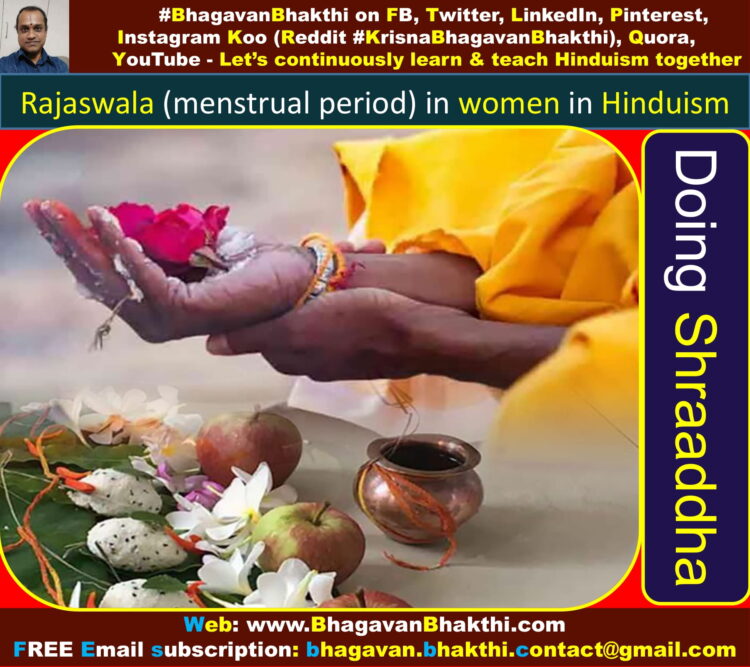
Their conversation was heard by Sumati, their (Dog and Ox) son, who went to some Rishis / sages nearby and asked them to tell what is behind the conversation between the Dog (Jayasri) and the Ox (Sumitra).
For this all the Rishi / sages told to Sumati that, his mother (Dog / Jayasri) had once ignored her rajaswala (menstrual period) and had done all the household works. Thus, she (Dog – Jayasri) has been born again as Dog in this life.
His (Sumati‘s) father (Ox – Sumitra) even after knowing that, his wife was in rajaswala (menstrual period) had the samparka dosha (Sin of touching her), so he has been born as an Ox. Thus finally, Sumati asked the Rishi / sages as to what is the remedy to free his parents from this dosha / sin.
All the Rishi / sages suggested that a vrata (vrat) named “Rishi Panchami” pooja / worship has to be performed. In this pooja / worship if all the Sapta Rishis (Seven Sages) pooja is done in the correct manner, then all the doshas / sins will be purified.
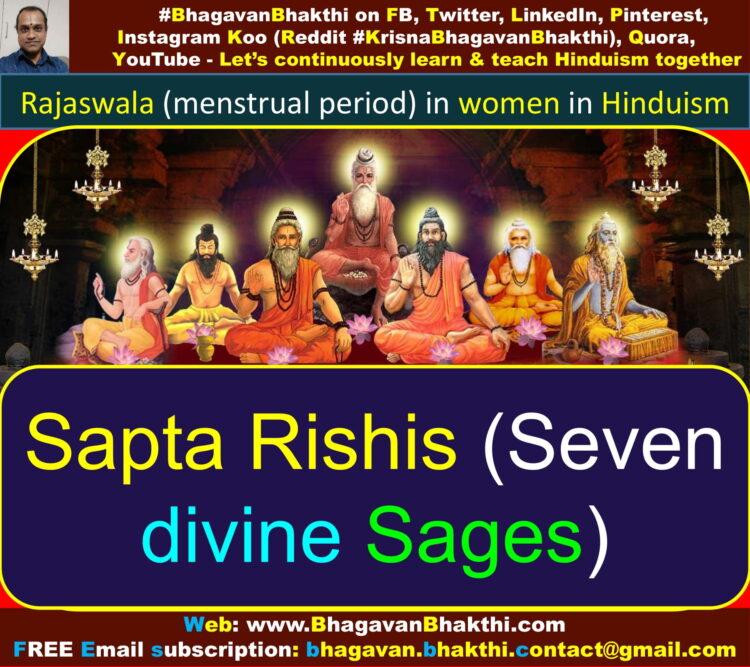
Continue reading about Hinduism (Sanatana Dharma) :
Hinduism (Sanatana Dharma) information, facts, etc.
Mahabharata information, facts, significance, importance etc.
Ramayana information, facts, significance, importance, etc.
More information will be added to this on regular basis. Please visit after some time for updated information.
To know about ‘About Sapta Rishi and Rishi Panchami’, please click the below link:
List of Saptarishis names and their unknown facts
What is Rishi Panchami and it’s unknown facts
To watch videos on #Hinduism #Sanskrit language, SUBSCRIBE to my YouTube channel from this below link:
#BhagavanBhakthi YouTube channel
Please visit the below link for more information for “List of Hindu Gods birthdays (Jayanti)“
List of Hindu Gods birthdays (Jayanti)
Dear friends, if you need any clarifications about this post, kindly let me know, I will definitely try to answer all of them.
Also your one LIKE, one COMMENT, One Share, one SUBSCRIPTION is highly important.
This will help to know the quality of this content and also it will be helpful to know if any improvements is required for the content.
If you feel this content is useful to you and has helped you to improve your knowledge, kindly share this with your well-wishers.
Because “SHARING MEANS CARING”.
To receive FREE EMAIL SUBSCRIPTION about #BhagavanBhakthi, you can send an email to bhagavan.bhakthi.contact@gmail.com from your email ID.
NAMASTE!
Sri Gurubhyo Namaha
Sri Krishnaaya Namaha
Sri Krishnaarpanamastu
Subscribe / Follow us Share in Social Media
I have been absent for a while, but now I remember why I used to love this website. Thank you, I will try and check back more often.
So much nonsense! That’s why people don’t like to be religious! Women are never impure, it’s nature process! What does it even mean to be impure?
Dear R
What nonsense have you seen here.
When a child falls in dirty water, we will tell that child “you have become dirty”.
That doesn’t mean that child is dirty. That child has to clean up his / her body by taking bath.
Same thing is applied here also.
It all depends on the way you think and don’t blame Hinduism.
Nowhere in Bhagwad Geeta, or any of the Vedas, has menstruation been mentioned. Please stop spreading fasle information.
Dear Prabesh,
Thanks for your comment.
Have you ever heard of the granthas like Mahabharata, Srimad Bhagavatam, etc.?
Then let me know, how come the word Rajaswala came into existence?
Bhagwad Geeta is the summary of all the Vedas. Even Puranas is part of the Puranas. There are many verses in Upanishath and Puranas which prove it.
Let me rephrase my comment. Bhagwad Geeta is just the summary of all the Vedas. So Bhagwad Geeta does not contain all the information about Hinduism. Even Puranas is part of the Vedas. There are many verses in Upanishath and Vedas which make a note that Puranas are part of it.
Prabesh, there is a very good logical explanation from Yogic perspective why a menstruating women is not supposed to cook food or go to the temple. Here it is:
During Menstruation the downward process of elimination of blood is predominated by the Apana Vayu. In other words, during the monthly periods, the Apana Vayu is in an exalted state. Any religious and spiritual activity, be it Yoga, meditation, Puja, fire ritual, or visiting temples, causes some degree of upward movement of Apana Vayu (urdwa gathi) in the body. Yoga, for example, aims to move Apana upwards, so that it merges with Prana and take an individual to a state of heightened self-awareness. Similarly, Puja and fire ritual, aims to awaken the Kundalini, by first making the Apana move upwards. Temples are basically centers of cosmic energies, which will have a similar effect on individuals as the Yoga or Puja. The energy and the environment in the properly consecrated temple will facilitate meditation and stillness of the mind by moving the Apana Vayu upwards. But, Apana Vayu being a downward moving force by its very nature, any attempt at making it move upwards during menstruation, will interfere with the menstruation process and hence will create an imbalance. Going to temple during menstruation will affect the normal functioning of the body (downward movement ) so it is not advised.
Even when a menstruating women cooks food with her body, she is investing the prana flowing in her body to that food. Thus, the person who eats the food cooked by menstruating women will have more downward moving force (Prana does not go in urdwa gathi during pooja after eating food) . Why does the uncooked rice called akshate given in Raghavendra mutt as prasadam? Because it is hold by the saints after meditation (after the prana in their body moving in upwards direction) in their hands.
Namastey sir .
Hari Aum
..I read somewhere that we must not chant Pranav during monthly cycles because when we chant it our prana or energy shift upwards and during menstruation it’s flowing downwards..so it will create disturbances…
But i want to know, Is it written in any vedic shastras.
Dear Samriti,
Thanks for your question.
In Kali Yuga almost all have lost the eligibility to chant the Pranava Mantra (OM). Only the correct Guru Parampara Sanyasis can chant the Pranava Mantra in Kali Yuga and not others.
This is because, we the Kali Yuga people have least knowledge about our Shastras (Hindu Texts) and almost don’t have the correct and right information.
Thus in Kali Yuga no one should use the Pranava Mantra except the Sanyasis as said earlier.
For example, if you are aware of a great Saint from south India called Sri Raghavendra Swamy.
We have a mantra on this divine Guru called “श्री राघवेन्द्राय नमः” (śrī rāghavēndrāya namaḥ). Here Sri is used instead of Pranava Mantra. Thus we need to avoid Pranava Mantra and should use Sri instead of it in Kali Yuga.
Shubhamastu!
can women other than the women in rajaswala offer the food to lord ? can rajaswala women eat that prasadam ?
Khushi Ji,
Thanks for your comment.
Anyone can offer food to Lord, but not in the first four days of Rajaswala period.
From 5th day (rajaswala period) you can offer and start eating prasadam.
Shubhamastu!